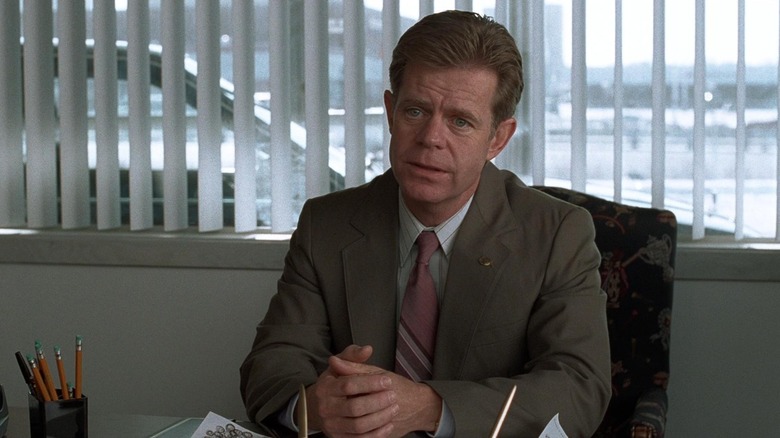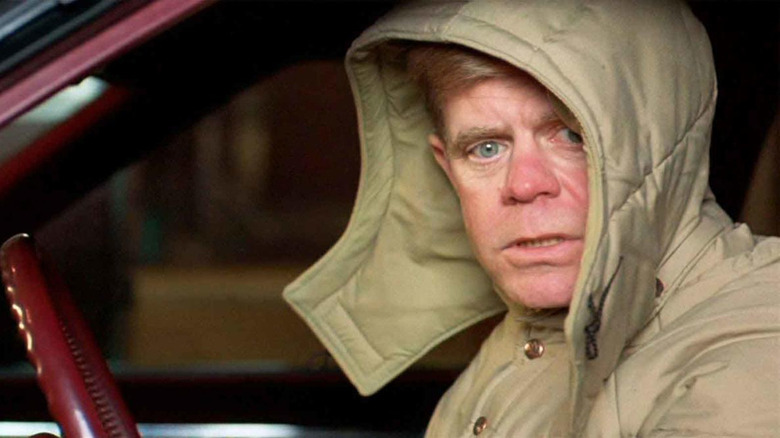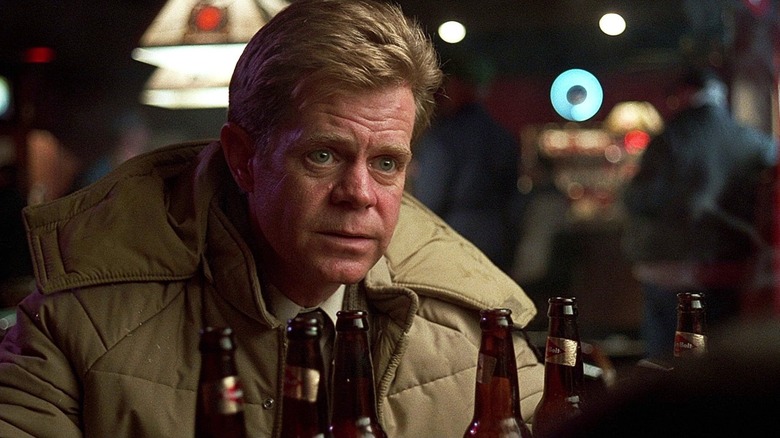The Coen Brothers' Fargo Script Made William H. Macy Lose His Mind
The little-seen 2003 movie "The Cooler" tells the story of a man so unlucky that he can make a living in casinos by bumming out a player's winning streak just by standing next to them. Who else in the modern history of cinema could play that part better than William H. Macy?
He has had a career spanning over 40 years and in that time he has played cops, lawyers, principals, army men, doctors, former quiz champions, and devoted fathers and husbands. But few actors can do squirmy desperation better, and his screen persona is defined by playing the pathetic, browbeaten, hapless losers of the world. Those roles may only make up a small proportion of his extensive filmography but they're the ones that really stick, most notably scheming car salesman Jerry Lundegaard in "Fargo" and the publicly cuckolded Little Bill in "Boogie Nights."
Those roles brought him to international attention, making the most of his hangdog expression, pensive eyes, and talent for playing little men just barely holding themselves together. Like Billy Bob Thornton, another character actor who became a big name thanks to his work in the '90s, those parts thrust him into higher profile roles in bigger-budget movies like "Air Force One," "Pleasantville," and "A Civil Action." More recently, he has applied his special talents to playing terminally unemployed Frank in the US remake of "Shameless," for which he has received six Primetime Emmy Award nominations. For many movie buffs, however, he will always be best remembered for that breakthrough role in "Fargo" which, by his own admission, he was born to play.
William H. Macy lost his mind over the Fargo screenplay
From "Blood Simple" onwards, the Coen Brothers have always excelled when it comes to casting. Their taut low-budget calling card was elevated by the performances of Dan Hedaya as a loathsome, jealous bar owner, M. Emmet Walsh as a sleazy double-crossing private eye, and Frances McDormand in her screen debut as the resourceful lover who uses her wits to survive the deadly neo-noir plot.
When it came to casting "Fargo," the Coens initially had William H. Macy in mind for a smaller part as a sheriff, but they also had him read for Jerry, a cash-strapped car salesman who gets way over his head when his scheme to hire two bungling crooks to hold his wife hostage goes disastrously wrong. Although he is constantly on the verge of folding under questioning from matter-of-fact Police Chief Marge Gunderson (McDormand), his grim determination to hold onto the ruse keeps him unconvincingly lying through his teeth. Macy was instantly smitten with the part (via BFI):
"When I read the script, I lost my mind... I read for the sheriff. Joel and Ethan said: 'That's real good. You want to go out and read Jerry?' They gave me about 20 minutes. I came in and read. They said, 'That's real good. You want to go home and work on it and come in tomorrow?' So I went home. Every actor I know did shifts [auditioning]. I went in and read it again. And they said: 'That's real good. We'll let you know.'"
As Macy said in another interview, Jerry was the role he was born to play, a part he intuitively understood. So he wasn't about to leave anything to chance.
William H. Macy threatened Ethan Coen's dog to get the part
Rather than wait for a call, William H. Macy took matters into his own hands to secure the part:
"I found out they [the Coen Brothers] were going to New York and holding a casting session there. So I got my Lutheran ass on an airplane and crashed the audition. I said: 'I want to audition again.' Then I made the joke to Ethan, which was: 'I'll shoot your dog if you don't give me this role.'"
Whether it was Macy's audition or the death threat to the pet pooch, he got the part and made it his own. To their credit, the Coens are well-known for allowing their actors to develop their characters (via The List):
"Once we've cast an actor in a part, the role or character essentially becomes their invention... I don't think either of us realized what a tough acting challenge we were handing Bill Macy with this part. Jerry's a fascinating mix of the completely ingenuous and the utterly deceitful. Yet he's also guileless; even though he set these horrible events in motion, he's surprised when they go wrong."
Their trust in Macy paid off. He completely owns a role that is as key to the film's success as Frances McDormand's Oscar-winning turn, and he received his only Academy Award nomination to date for his performance. It's hard to imagine anyone else playing Jerry so well. Martin Freeman came close in the "Fargo" TV series, bringing his trademark British awkwardness to the part of Lester Nygaard, Jerry's equivalent in the show. Freeman received several nominations for his performance but he didn't thread the needle as well as Macy, who managed to make his character both pitiful and detestable. When it comes to playing losers like Jerry, William H. Macy is the only winner.


